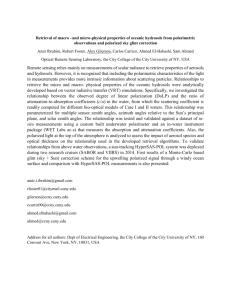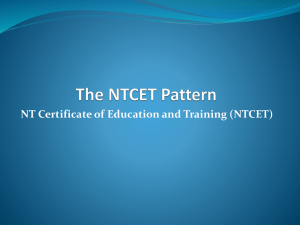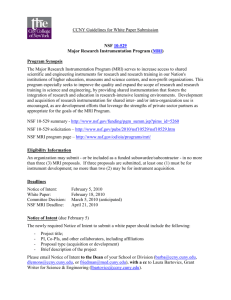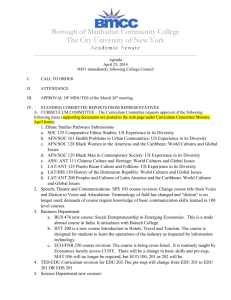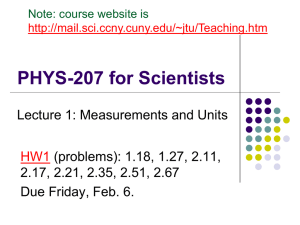Earth System Science & Environmental Engineering
advertisement
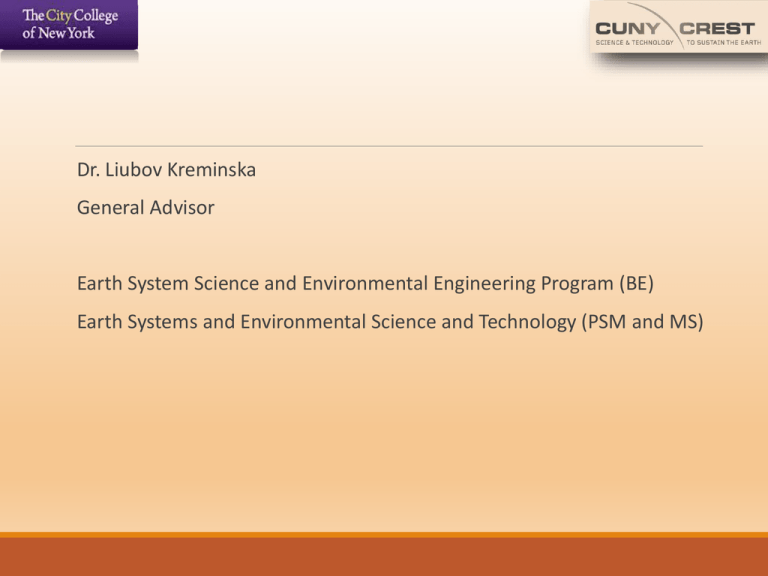
Dr. Liubov Kreminska General Advisor Earth System Science and Environmental Engineering Program (BE) Earth Systems and Environmental Science and Technology (PSM and MS) Masters Program Earth Systems and Environmental Science and Technology (ESEST) A new PSM Option at City College of NY Reza Khanbilvardi Director, MS ESEST & PSM Program The City College of the City University ESES/REU Orientation Week June 11, 2014 Earth System Science and Environmental Engineering Mission Provide students with professionally oriented educational opportunities to enhance their knowledge of theory, technical capacity, job-ready skill sets in multidisciplinary earth system and environmental sciences and engineering. Earth System Science and Environmental Engineering Goals and Objectives To educate a diverse student body in basic and applied academic and research areas leading to new ideas, systems and solutions in the environmental engineering, earth systems science and related fields. To groom the next generation scientists and engineering by providing appropriate internship opportunities to the students in private sectors, industries, government agencies, and other academic institutions What is the PSM? • is an innovative, terminal graduate degree designed to allow students to pursue advanced training and excel in science while simultaneously developing highly-valued business skills. • is characterized by "science-plus," combining rigorous study in science or mathematics with skills-based coursework in management, policy, or law. • is developed in concert with industry and is designed to dovetail into present and future professional career opportunities. About MS ESEST • Masters in Earth System Science & Environmental Engineering (ESEST) officially began in Fall 2013 after the Dept. of Education approval in Spring 2013 • MS in ESEST allows students to take a rigorous academic approach that combines the basic engineering requirements with a thorough scientific foundation. • Flexibility is achieved by choosing courses of interest from a large number of electives. • Students are strongly encouraged to engage in cutting-edge ongoing research at CCNY as well as industrial partners and federal and local agencies through internships. • Placement assistance is provided through the program. Application deadline: May 15, 2014 Concentrations • Water Resources Engineering Management (WREM) • Geoinformatics & Geographic Information Systems (GIS) • Climate & Remote Sensing • Energy Interdisciplinary Program Close collaboration between: • Engineering: Civil, Mechanical, Electrical • Earth and Atmospheric Science • Sustainability in the Urban Environment Admission requirements • • • • GRE Required: No Minimum TOEFL Scores: 533 (PBT), 73 (IBT) Degree Awarded: PSM/MS (ESEST) Supporting Documents Required: • Official transcripts from all post-secondary institutions attended 2 letters of recommendation Resume/CV Personal Statement • • • Curriculum •The PSM Degree in Earth Systems and Environmental Science and Technology requires minimum 30 credits •Each of the concentrations requires a core of courses specific to it plus technical electives Curriculum Contd… • 4 required courses covering core topics (12 credits) • 1 distribution course and Internship (6 credits) • 3 courses in a specific area of concentration (9 credits) • Final project: Internship with an employer in industry, government, or non-profit organization (3 credits) Ex. Fall’14: map of classes (subject to change) Convenient afternoon schedule Reasonable Student Schedule First Semester Second Semester Full-Time Core 1 (3 cr.) Core 2 (3 cr.) Core 3 (3 cr.) Distribution 1 (3 cr.) Distribution 2 (3 cr.) Core 4 (3 cr.) Concentration 1 (3 cr.) Concentration 2 (3 cr.) Concentration 3 (3 cr.) Final Project (3 cr.) 30 credits total 15 credits 15 credits First Semester Second Semester Third Semester Fourth Semester PartTime Core 1 (3 cr.) Core 2 (3 cr.) Distribution 1 (3 cr.) Core 3 (3 cr.) Distribution 2 (3 cr.) Core 4 (3 cr.) Concentration 1 (3 c.) Concentration 2 (3 cr.) Concentration 3 (3 cr.) Final Project (3 cr.) 30 credits total 9 credits 6 credits 6 credits 9 credits MS Program History since 2013 • First students came in Fall’13 • Diverse group includes: • first generation, Hispanic, AfricanAmerican, female students • Average GPA is 3.63 MS Program Fall 2014 • First 3 students are expected to graduate • Eight more students are admitted (admissions rate is 50%) Who should apply students with different backgrounds: •not only in different engineering disciplines, •from physics, chemistry, geosciences. Where to find information? •http://www.ccny.cuny.edu/enveng/psmgraduate.cfm •http://www.ccny.cuny.edu/enveng/graduat e.cfm Potential Jobs opportunities For ESEST Graduates • NOAA CREST • ESES GRADUATE INITIATIVE Fellowships available Thank you Contact us!! Dr. Reza Khanbilvardi Executive Director, CUNY CREST Director of MS – ESEST and PSM Khanbilvardi@ccny.cuny.edu Dr. Shakila Merchant Assistant Director NOAA-CREST Center CUNY Remote Sensing Earth System merchant@ce.ccny.cuny.edu Dr. Barry Gross Professor of Electrical Engineering and Advisor, MS program gross@ccny.cuny.edu Dr. Liubov Kreminska Program Administrator Earth Systems and Environmental Science and Technology, MS Grove School of Engineering ese@ccny.cuny.edu
